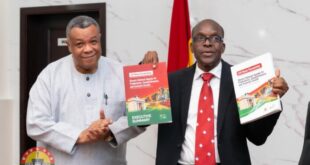The 1992 Constitution of Ghana provides for the principle of equality before the law. Simply put, all persons in Ghana are equal before the law, and no one is above the law.
That notwithstanding, the same constitution grants immunities, including what is referred to as permanent immunity or impunity (i.e. the indemnity provisions), as well as both substantive and procedural immunity to certain categories of public officials, in the performance of their functions.
Substantive immunity simply means that the immunity in question is absolute (even though it may be temporary in nature and only for a particular period of time); Procedural immunity on the other hand means that the immunity in question is not absolute but carefully circumscribed, which can be circumvented one way or the other.
For instance, the President of the Republic when he is in office is immune from civil or criminal liability for any act and/or omission of his, until he leaves office (substantive immunity, albeit temporary).
This means that when he is on office, the President of the Republic cannot be sued, neither can criminal proceedings be brought against him in respect of any offence he may have committed or is alleged to have committed (he may however be impeached).
Considering his numerous executive duties and functions, the President must be insulated from personal suits so as to be able to focus on the serious business of governance – this seems to be the rationale for this immunity.
The President also enjoys procedural immunity when in office; hence, he is not liable to proceedings in any court for the performance of his functions, or for any act done or omitted to be done, or purported to be done, or purported to have been done, or purporting to be done in the performance of his functions.
In simple English, the President cannot be personally sued in his name or be made a defendant in judicial proceedings, or be made personally liable for the results of the proceedings for the performance of his functions as President; but rather, his acts and/or omissions that fall foul of the constitution for instance may be challenged by bringing an action against the Attorney General, either for the enforcement of the constitution under Article 2 or by way of the prerogative writs; and the Attorney General for such purposes is the nominal defendant – being the chief legal adviser to the government (and by extension, the President).

The rationale for this procedural immunity granted to the President was succinctly put in the case of Sallah v. The Attorney General by Archer JA (as he then was) in the following words: “The policy … is too obvious. Is it proper that the Head of State should be dragged into the court room while he holds office? The answer is definitely no. The dignity and the aura of respectability in which the office of President is enveloped must be preserved. The sensible reason for not suing the President in court is to preserve his dignity.”
This rationale was reiterated subsequently in the cases of NPP v. Rawlings and Amidu v. Kufuor. With regard to the Judiciary, the 1992 Constitution provides that a Justice of a Superior Court or any person exercising judicial power for that matter, shall not be liable to any action or suit for any act or omission by him in the exercise of that judicial power (this immunity is substantive).
The rationale for this immunity is that since the Judiciary’s role is the resolution of disputes and it is exclusively vested with final judicial power to the exclusion of all other bodies, there is a duty on the State to provide some form of immunity to judges in respect of the decisions they deliver.
So, in the case of Bilson v. Apaloo, it was held that “Judicial immunities from suit are conferred not for the benefit of the judges but for the benefit of the administration of justice … Neither the common law nor the Constitution, 1979, permits a person to abuse the legal process or else bring the administration of justice into contempt by scandalizing a court or a judge in any action or suit for any matter or thing done by a judge in the discharge of his duties as a judge.”
Finally, Parliament, and Members of Parliament in particular also enjoy certain privileges and immunities under the Constitution, which is directly tied to the performance of their functions. So for instance, freedom of speech, debate and proceedings in Parliament cannot be impeached or questioned in any court or place outside Parliament (substantive immunity).
Similarly, in the performance of their functions, specifically with respect to the presentation of petitions, bills, motions etc. in or before Parliament, MPs are immune from civil or criminal proceedings in respect of such matters (this is also substantive immunity).
The Constitution further provides immunity from service as a juror in respect of the Speaker, members and the clerk to Parliament (substantive immunity once again).
In another breadth however, neither the speaker, members or the clerk to parliament shall be compelled while attending parliament to appear as a witness in any court or place outside parliament (procedural immunity) – thus, they may voluntarily choose to appear as a witness whether or not they’re attending parliament, or when they are not attending parliament, they may be compelled to appear in court as a witness in a case for instance
And finally, civil or criminal processes emanating from any court or place outside parliament shall not be served on the speaker, members or clerk to parliament when they’re on their way to Parliament, and attending at or returning from any proceedings of parliament (procedural immunity).
In simple terms, for so long as parliament is in session, the speaker, MPs and the clerk may not be served with civil or criminal processes ordinarily.
The procedural nature of this immunity, can be ascertained by the wording of article 117, which clearly and only states the circumstances under which civil and criminal processes may not be served on the speaker, MPs and the clerk to parliament; it does not however say that these aforementioned persons can never be served with processes emanating from outside parliament.
The 1969 Constitution, (specifically article 93) was the first time this immunity provision for MPs was introduced into the Ghanaian political space.
It is important to note that the Committee of Experts Report in relation to the 1969 Constitution provided the justification for the need for parliamentary immunity from arrest and the service of court processes.
It was their opinion that, such immunity ensures that MPs were not distracted through arrest and detention while they are commuting to and from Parliament or while they are attending Parliament.
The Committee further noted that the immunity should not be made to cover serious offences such as treason, sedition and felony, or to apply to offences in flagrante delicto (feeli feeli).
It was therefore proposed that civil or criminal processes issuing from the courts or any place outside Parliament could be served on MPs with the prior permission of the Speaker. This seems to be the basis for the operationalization of Article 117 of our current constitution and the seeming constitutional convention and practice that has developed therefrom.
As a matter of fact, the Constitution Review Commission in 2011 noted that: “… this immunity from the service court processes and arrest may be necessary to prevent the use of such processes to impede the work of Parliament. However, this could contribute to a culture of impunity as it has in recent times been exploited by Members of Parliament to evade justice. An erroneous perception that members of Parliament cannot be arrested has been encouraged and is gradually gaining ground.”
That notwithstanding, this provision in particular is still a source of some controversy, and has been so in the past few days and weeks, generating heated debates on the meaning, scope and purpose of this immunity.
The issue however is not whether or not a member of parliament can be arrested or served with civil or criminal processes, as I have just explained, because MPs are not above the law, but rather they are subject to the law like every other Ghanaian.
Rather, the proper questions to ask, on the basis of article 117 of the constitution, which is captioned “immunity from service of process and arrest”, and its historical antecedents are two-fold:
1. Under what circumstances can the speaker, an MP or the clerk to parliament be served with civil or criminal processes emanating from outside Parliament?
The answer is simple: When they are not on their way to parliament; and when they are not attending at or returning from any proceedings of parliament. So for instance, if Parliament is in session and an MP is driving to Parliament for a sitting, and this can be ascertained, he or she will be immune from the service of any court process and cannot be arrested either.
Similarly, if he or she is on his or her way from Parliament after proceedings, the immunity will once again apply. However, if it is clear, that the MP is neither on his way to, attending at or returning from proceedings in Parliament (even if Parliament is in session), for instance on a weekend where the MP concerned is in his constituency, the immunity will not apply. Also, if an MP commits an offence in flagrante delicto (feeli feeli), there is no immunity in that regard
2. What then is the procedure for serving civil or criminal processes on the aforementioned persons?
There does not seem to be any constitutional provision catering for this. As indicated earlier, it seems as though a constitutional practice or convention of some sort has been developed over the years, tracing its roots to the Committee of Experts Report for the 1969 Constitution, which proposed that civil or criminal processes issuing from the courts or any place outside Parliament could be served on MPs with the prior permission of the Speaker.
This seems to be the practice today. As a matter of fact, the 2011 Constitution Review Commission Report recommended a constitutional change to Article 117, in the following words:
“The Commission recommends that Article 117 be amended to allow civil or criminal processes coming from outside of Parliament, to be served on the Speaker, Deputy Speakers or Members of Parliament through the Clerk of Parliament and on the Clerk through any Deputy Clerk of Parliament when Parliament is in session. Where Parliament is not in session, Members of Parliament may be served in the ordinary way.”
From the foregoing, and in light of the Francis Xavier Sosu situation, we may reasonably and safely arrive at some conclusions:
1. In leading or participating in a protest or demonstration in his constituency on the day in question (Monday 25th October 2021), the Honourable Member of Parliament cannot by any stretch of the imagination be said to have been on his way to, attending at, or coming from a proceeding of Parliament – even if Parliament was in session.
2. That notwithstanding, assuming this first conclusion is erroneous and indeed he was on his way to, coming from or attending Parliament, if during the protest or demonstration, he committed or is alleged to have committed or instigated or in any other way facilitated or aided the commission of a criminal offence, no immunity from arrest will be applicable, especially if the alleged offences were allegedly committed in flagrante delicto (feeli feeli).
3. Assuming the Police had actually been dispatched to the MPs church to effect his arrest on the following Sunday (something the Police administration vehemently denies), they would have nonetheless been well within their rights to effect such an arrest as long as there was reasonable basis, because once again, it cannot be reasonably argued that an MP attending church on a Sunday is coming from Parliament, attending a proceeding of Parliament or preparing to go to Parliament the next day!
Any contrary interpretation of this provision in this particular instance would give credence to the “culture of impunity” alluded to by the Constitution Review Commission, as well as be an acknowledgement of the erroneous impression that MPs cannot be arrested.
Remember, that this immunity enjoyed by MPs is not absolute, even when Parliament is in session!
4. Finally, and on the basis of my analysis thus far, the Speaker of Parliament, in my humble opinion, was therefore wrong when he indicated that because Parliament was in session, he could not release the Honourable Member of Parliament for Madina for the purposes of assisting the police in its investigations. This is because the immunity granted to MPs under article 117 of the Constitution is not absolute.
In conclusion, it is important to note that there is reasonable justification for the provision of “immunity from service of process or arrest” in respect of MPs in the performance of their functions; because without that, an overbearing Executive (which the Police Administration comes under) may deploy the police to deal with certain MPs by way of unmeritorious and unwarranted arrests (for political purposes for example), which has the tendency of stifling and impeding parliamentary work and making nonsense of the dignity and sanctity of Parliament as an independent branch of government.
That notwithstanding, maybe the time has come for us to revisit this immunity provision of the Constitution, to remove any ambiguity in terms of its nature, scope and purpose (the Constitution Review Commission showed us the way).
Maybe, the Supreme Court will be called upon to clarify this situation, which I suspect will happen sooner rather than later, (that is if such an action hasn’t already been brought).
What is definite in all of this is that, immunities (both substantive and procedural) granted under the constitution to certain classes or categories of persons i.e. the President, Justices of the Superior Courts and other persons exercising judicial power, and the Speaker, MPs and the Clerk to Parliament, are for particular purposes and may be for a particular period of time and limited in scope.
Let us therefore not wallow in the mistaken and erroneous belief that when Parliament is in session, MPs are absolutely immune from service of processes and/or arrest; because the truth is that THEY ARE NOT!
The writer, Dr. Kwaku Agyeman-Budu, is a law lecturer and the head of law centres at the GIMPA law faculty and the host of “The Forum” on Asaase Radio, 99.5MHz.

Congratulations
#MyGhanaMediaNetwork@1year
Source: asaaseradio.com


Send your news stories to myghanamedia@gmail.com and Chat with us via WhatsApp on +233 200818719
 MYGHANAMEDIA.COM Best Source Of Latest News
MYGHANAMEDIA.COM Best Source Of Latest News




